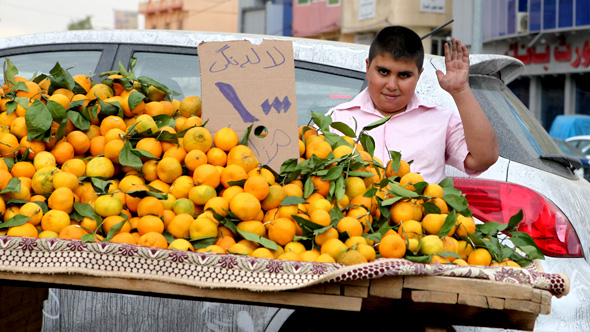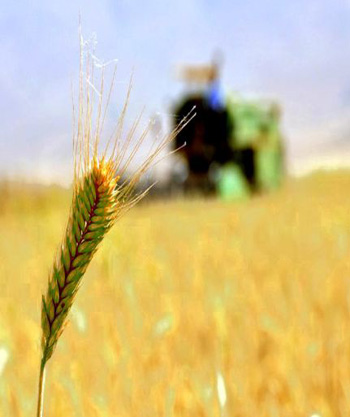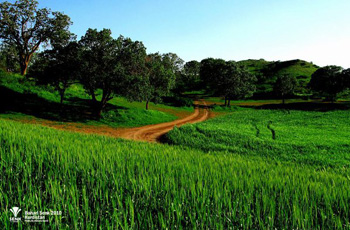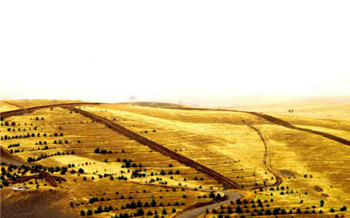Kurdistan: Agriculture Taking Second Place to Oil Development
Investing in the agriculture sector is of continuing interest to the KRG, for reasons practical – becoming food self-sufficient- and also for reasons historical and cultural.

KURDISTAN: This region of northern Iraq was once considered the breadbasket of Mesopotamia, if not a good part of the sandy Middle East. But for a variety of negative reasons – though the Region boast a large amount of arable and fertile land – agriculture has been a less than productive sector for several decades, first because of the decimation suffered during the Saddam Hussein regime and now because of the more lucrative business of oil and real estate. But investing in the agriculture sector is of continuing interest to the KRG, for reasons practical – becoming food self-sufficient- and also for reasons historical and cultural.
In a recent interview with MarcoPolis.net, Kurdistan Prime Minister Nechirvan Barzani noted that achieving self-sufficiency was “a key priority for our government.” Barzani added that while the autonomous Region had markedly enlarged the oil & gas industry to the point of exporting up to 250,000 bpd, work remained in rebuilding the agricultural sector. “Our Region used to be very rich in agricultural products; in fact it was more often referred to as the food basket for the country. Today, the Region imports most of its produce despite the fact that there are local produce available; our Region still lacks the experience and expertise about taking these products to the market,” Prime Minster Barzani said. “Over the next several years, our government will be supporting measures to attract much-needed attention and investment to these areas.”
The fertile river valleys and plains of this Region played host to some of the first known agriculture, with farming and animal husbandry having been dated back to around 7,000 years ago. Because of the destruction of many of the farming village by the troops of Saddam Hussein and the current emphasis on other economic sectors, what was once the breadbasket of Iraq has now become a “rentier” economy with the autonomous Kurdistan Region using its large cash supply from the oil economy for net imports of the majority of its food products from neighboring Turkey and Iran. According to Turkish officials, Kurdistan imported about USD 7 billion in goods last year, most of which was food. Iran exports a large amount of livestock to Kurdistan. Because the sector is starting from a low baseline, some investment advisors make the salient argument that the sector can only go up: “…we have good agriculture that could be developed and we have had now almost 30 or 35 years of zero development. Thus, we are starting from a low base,” said Shwan Ibrahim Taha, Chairman of Rabee Securities. “Many investors, who come to Iraq and look at Iraq, ask me ‘what shall we invest in, in Iraq?’ and I say ‘there’s a long answer to that question because you can invest in everything,’ the better question would be: what should I not invest in?”
Jamal Baban, an ethnic Kurd and longtime UN agriculture expert who also served as the Minister of Agriculture to the Sulaymaniyah governorate, noted in an interview with Rudaw.Net, “The agricultural sector in Kurdistan is dilapidated because of Iran-Iraq war, the genocidal Anfal campaign, the chemical bombardment and the evacuation of villages… Also, rising inflation, economic embargos and the oil-for-food program destroyed the agriculture sector even more. If the wars and evacuation of villages weakened agriculture, then the UN oil-for-food program killed it.”
The Ministry of Agriculture and Water Resources issued a directive in October giving back various parcels of agricultural land to their previous Kurdish owners opening the way for owners to resettle lands that had been occupied for more than 30 years. The KRG will also provide subsidies to those farmers receiving land back.
While Baban was Agriculture Minister in the Sulaymaniyah governorate he was unsuccessful stopping two large residential projects slated for developing former agricultural land, which has been a pattern throughout the Region. “When I was minister, I issued a decree to stop the expansion of Halabjay Taza district so that agricultural land would no longer be taken because you can’t let one of the most fertile plains in Kurdistan – such as Sharazour Plain – to be turned into a residential area,” Baban told Rudaw.net. “It didn’t succeed and wasn’t even talked about afterward.” He added that the same happened to his attempted preservation efforts in the Piramagroon district.
A small detail perhaps, but metaphorically important, is that Financial Times reporter Simeon Kerr recounted in an article about food security in Kurdistand how “the collapse of domestic produce is apparent when looking for Erbil’s renowned white sheep’s cheese, a Kurdish produce once prized across Iraq. While Turkish manufactured produce and Iranian vegetables are plentiful, only a few stores sell the pungent delicacy in Erbil’s covered souk.” The above challenges noted, the KRG Ministry of Agriculture and Water Resources is pushing toward the goal of food self-sufficiency, one step at a time.
According to Herish Muharam, Chairman of the Kurdistan Board of Investment, the policy going forward is that the KRG will give more lucrative incentives to the agriculture sector, besides the other priority sectors of industry and tourism. “Incentives will not be given out equally to all sectors. We would be giving higher incentives to some more prioritized sectors and less to other sectors or in some cases no incentives at all, because competition has been very high so we need to slow down and give fewer incentives to certain sectors.”
The Ministry of Agriculture and Water Resources issued a directive in October giving back various parcels of agricultural land to their previous Kurdish owners opening the way for owners to resettle lands that had been occupied for more than 30 years. The KRG will also provide subsidies to those farmers receiving land back.
Starting in 1981, the Hussein regime launched a land-seizing campaign as part of an “Arabization” of various areas. Under a decree from Baghdad, land was taken under threat of force from Kurds who held legal ownership documents. The compensation was only 15 Iraqi dinars per acre of rain-fed land and only 30 dinars for irrigated farmsteads, leaving the previous owners with very little even for the exchange rates at that time.
During the World Kurdish conference in October 2012 in Erbil, Serwan Baban, Minister of Agriculture and Water Resources for the KRG gave some of the following figures for current food production and the goals the ministry was setting for increase of various commodities.
Baban added that only 30 percent of the fruit needed for self-sufficiency will be reached by 2013 while vegetable production will achieve 80 percent of self-sufficiency in 2013.
According to the minister, the production of oat, corn, sunflower, red meat, milk, tomatoes, grapes, apples and other fruits in 2011 was less than 50 percent of the amount required for self-suffiency. He added that for 2013 the ministry projects the production of up 40,000 tons of red meat – double the 2011 figure – and 150,000 tons of oats – also double – along with a marked increase in the amount of egg production.
Baban added that only 30 percent of the fruit needed for self-sufficiency will be reached by 2013 while vegetable production will achieve 80 percent of self-sufficiency in 2013. The ministry will facilitate support for Kurdish farmers and increased production by the use of “new methods and technology, the improvement of farm equipment, the introduction of transport subsidy, modern machinery and training in contemporary agricultural methods and techniques as well as health and safety issues”.
Perhaps more controversial, the KRG may ban certain categories of imports as those commodities reach near self-sufficiency in Kurdistan, with the view that such bans will help protect local growers.
In many ways, most of these measures mirror those used for other sectors by trying to attract FDI and technologically advanced foreign companies in order to quickly develop the respective sectors.
Mr. Baban also added that a top priority is providing sustainable water resources, which despite the presence of a large rainfall, five rivers and many lakes, may be threatened by the dam building of neighboring countries.
Many local conglomerates have started to shift their strategy and to invest into agriculture.
Zozik Group, one of the five largest private companies in Kurdistan, is going ahead with a multi-million dollar livestock and dairy project with foreign partners, according to Faisal K. Khan Brandosti, company vice president.
Al Sofy Group of Companies, according to Ibrahim Sofy, General Executive Manager, is finishing one of the largest agricultural projects (greenhouse vegetables production) in Iraq.
And many medium size companies are now turning away from construction and contracting business to agriculture, like the Salaei Group, which is seeing more profit potential in the agricultural sector.
The Kurdistan Region is rich in water resources with five large rivers that run through it. These include the Khapoor, Great Zab, Little Zab, Awaspee, and Seerwan. The total annual water flow capacity stands at 30 billion cubic meters. About 59.8 percent of the water sources of the rivers mentioned is from the Kurdistan Region, and 40.2 percent is sourced outside of the Region. The total arable land in the Kurdistan Region is 1,535,794 hectares. If the water is used properly, it could irrigate the entire land instead of the 11 percent it currently irrigates.
In addition to the five rivers mentioned above, the Region has springs, groundwater, and rain water from the annual rainfall of 8 billion cubic meters. However, most of it is wasted as it falls into the land and valleys without being used.